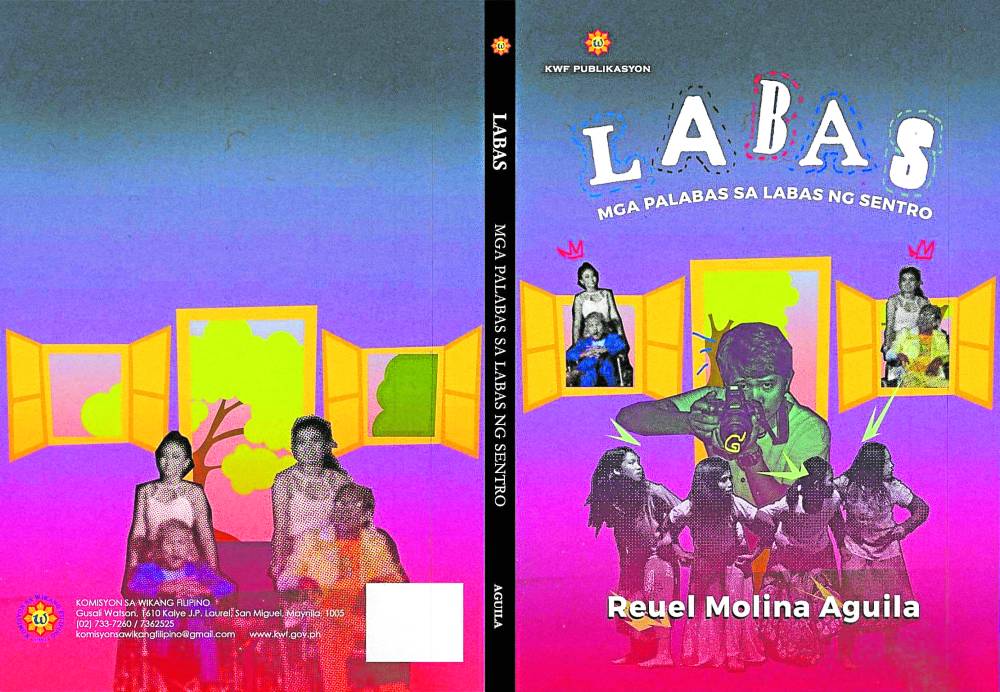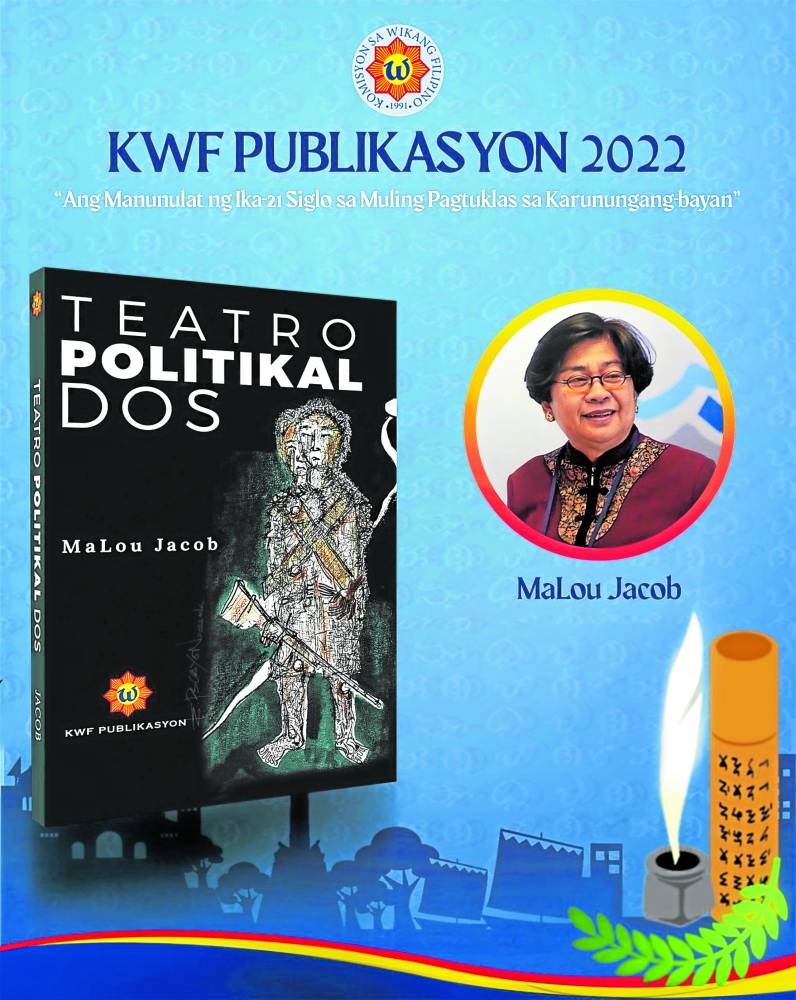Authors unbowed after gov’t ‘purge’ of books

PULLED OUT Among the five books blocked by the Komisyon ng Wikang Filipino for supposedly espousing antigovernment thought are Reuel Molina Aguila’s “Labas: Mga Palabas sa Labas ng Sentro” and Malou Jacob’s “Teatro Politikal Dos.”
The authors of five Filipino-language books that stopped printing or were ordered pulled from shelves for being “subversive” by the Komisyon ng Wikang Filipino (KWF) have vowed not to cower in silence, as outrage rose in the literary community over the commission’s directive.
Rommel Rodriguez, writer of “Kalatas: Mga Kuwentong Bayan at Kuwentong Buhay,” one of the discontinued titles, said the KWF’s decision only emboldened him further to write stories about the Filipino people.
“Censorship is my muse,” he told the Inquirer on Friday, adding: “The more an artist or writer is prevented from writing, the more enthusiastic we become and the more we want to write.”
Rodriguez, a professor at the University of the Philippines Diliman’s Filipino and Philippine literature department, said he felt “very challenged” by the KWF’s actions but also “afraid [for] my security and safety because of the Red-tagging,” with his writings being linked to the communist insurgency.
Use of ‘revolution’
He acknowledged that his book, a social-realist anthology of flash fiction, contained political themes. “I used the word ‘revolution’ in my work. But I did not tell my readers to take up arms and fight the government,” Rodriguez said.
READ: Language agency joins book purge, tags 5 ‘subversive’ works
Don Pagusara, another writer whose work, “May Hadlang ang Umaga,” was dropped by the KWF, said in a statement issued by the artist group Tanggol Wika that the parts of the book considered subversive by the KWF were not even meant to be historical accounts. “It was fictional but based on true events that happened inside the YRC,” he said, referring to the Youth Rehabilitation Center, a former maximum security prison at Fort Bonifacio in Taguig City.
“May Hadlang ang Umaga” is a play about life in the facility, where many political dissidents were incarcerated during the brutal dictatorship of President Marcos’ late father and namesake.
The other books that the KWF stopped printing were “Teatro Politikal Dos” by Malou Jacob, “Tawid-diwa sa Pananagisag ni Bienvenido Lumbera: Ang Bayan, ang Manunulat, at ang Magasing Sagisag sa Imahinatibong Yugto ng Batas Militar 1975-1979” by Dexter Cayanes and “Labas: Mga Palabas sa Labas ng Sentro” by Reuel Aguila.
Libelous claims
In a joint statement on Friday, the five authors demanded that the KWF commissioners, as well as the hosts of pro-government media network SMNI who called their works subversive, recant their allegations.
“What is this travesty? Their claims are libelous and would put our lives in grave danger,” they said.
“We believe that censoring the different experiences and stories of the Filipino people is a form of violence and harassment. We believe it is a form of terrorism when a (group of) people can dictate what books should be written and how they should be written,” the authors said.
In a Facebook post on Friday, National Artist for Literature Virgilio Almario, a former chair of the KWF, called on the commissioners not to involve the arts in their squabble.
“The vigor of the national language and literary freedom are among the nation’s sacred aspirations. Leave them out of the power struggle within KWF and its rotten bureacracy,” he said in Filipino.
READ: UP dep’t, Makabayan bloc decry red-tagging of KWF chair, Filipino authors
On Friday, Arthur Casanova, the embattled KWF chair, defended the five books, saying they had all passed the commission’s review process.
He said the works even “received the imprimatur” of the two other commissioners, Carmelita Abdurahman and Benjamin Mendillo Jr.
Abdurahman and Mendillo, however, were the two signatories in the Aug. 9 memorandum ordering the KWF unit Sentro ng Wika at Kultura (SWK) to cease printing the “political, subversive and creative literary works with subliminal ideologies that encourage to fight the government.”
In a statement, Casanova, a renowned author, educator, linguist and theater director, said the claim that the books were subversive “is a dangerous accusation which may already be stepping on the boundaries of freedom of expression and academic freedom.”
All SWK directors were advised to refrain from distributing the books so that “we would not be accountable” to Republic Act No. 11479, or the Anti-Terrorism Act of 2020, particularly Section 9 on “inciting to commit to terrorism.”
According to a source, the writers and their works were apparently caught in an internal conflict in the KWF, as some of the commissioners are said to be moving for the ouster of Casanova, whose term as chair ends in 2027.
Speaking on ANC on Friday, Mendillo insisted that the KWF “respects, encourages and protects the constitutional right to freedom of expression of every Filipino” but “must conform to laws, rules and regulations.”
Under OP
“As a government agency under the Office of the President (OP), the commission should only perform its mandate under RA 7104 and always adhere to law and duly constituted authorities,” he said. The commissioner pinned the blame on Casanova, claiming the contracts for the publication of the titles had not been authorized by the KWF board and “were the sole and unilateral acts of the chairman and void ab initio.”
That was the same claim in an August 10 resolution of the KWF board condemning the publication of the “dangerous” materials.
The resolution submitted to the OP was signed by five commissioners: Abdurahman, Mendillo, Hope Yu, Alain Russ Dimzon and Angela Lorenzana, who said the books contained “subversive themes, [and] explicit anti-Marcos and anti-Duterte contents.”
Casanova, however, denied railroading the publication of the books, calling the allegation “untrue and unfounded.”
READ: KWF chair, language orgs decry red-tagging of books, authors
Marxist ideas
“This is but the latest in a series of actions being aimed against me to destroy my character and to disrupt efforts to strengthen and cleanse the KWF,” he said.
Senate Minority Leader Aquilino Pimentel III on Friday decried the KWF’s move.
“This is not good. Filipinos should have access to different kinds of ideas, including those of Karl Marx,” he told the Inquirer.
Kabataan Rep. Raoul Manuel said the KWF’s order only proved the “chilling effect” of the antiterrorism law, which the Supreme Court had affirmed as constitutional except for two provisions.
Project Gunita, a group that has been archiving materials on the Marcos dictatorship, said only cowards and liars were frightened by the truth.
Josiah David Quising, one of group’s cofounders, said narrating historical truth about the Marcos regime “will never be subversive.”
“Only a paranoid government is afraid of books,” said Karapatan secretary general Cristina Palabay.
